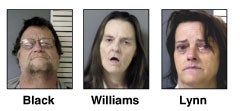Grand jury testimony, schizophrenia issues raised in murder case
Published 12:00 am Friday, January 16, 2015
Whether or not defendants in a murder case should be privy to a co-defendant’s grand jury testimony, and how that defendant’s medical history and alleged schizophrenia could affect the case are just two of the issues presiding Circuit Judge Ashley McKathan considered on Thursday.
McKathan heard pre-trial motions and arguments in the cold case trials of two of three remaining suspects in the 1994 murder of James “Nibby” Barton.
Eugene W. Black and Sheila Williams are set to be tried for murder and robbery I later this month. Montgomery attorney Peter Bush represents Black and David Baker of Opp represents Williams.
Specifically, the attorneys Thursday discussed two issues related to a third woman charged in the case, Sandra Ellision Lynn, whose trial has not been set. Lynn originally was represented by Meredith Peters, who has withdrawn from the case. Gypsy Smith has been appointed to represent Lynn.
Bush, who represents Black, said he previously had requested copies of witness statements from the state.
District Attorney Walt Merrell said he had supplied all of the statements he was required to produce except the statement the third suspect, Lynn, gave to the grand jury.
“Because of the grand jury secrecy laws, we produced the existence of that statement. We did not produce the content. Basically, the court has to order me to do it,” Merrell said. “I found myself in a Catch 22 between the obligation to produce and the grand jury secrecy laws.”
Baker asked if the grand jury statement was consistent with what Lynn told law enforcement officers in other interviews.
“They are consistent, but I can’t remember off the top of my head if (the grand jury testimony) is more detailed,” Merrell said.
McKathan asked if it is likely the state will use the grand jury testimony to refresh the recollection of the witness during her testimony.
Merrell replied that the “appropriate answer is it is certainly possible; I shy away from the word ‘likely.’ ”
McKathan told defense attorneys he would not rule from the bench, but said if upon research, he decides he can lawfully let them have the information, he will.
Both Bush and Baker also raised questions about the availability of Lynn’s medical records. Bush said she previously has been diagnosed with schizophrenia, and he would like to know what drugs have been prescribed for her between 1994 and now.
Baker explained that Ms. Lynn’s physician has cancer and has closed his office.
“This is not a matter in which we can subpoena his records,” Baker said. “There is a report that gives an extensive medical history, but HIPAA does not allow us to have it.”
Baker said much of that history may be relevant to the case.
Smith opposed the release of that report because it contains “protected health information.”
Baker offered that he had no problem with parts of the report being redacted.
“I don’t have any trouble redacting anything embarrassing that doesn’t have anything to do with her mental capacity,” he said. “If she’s heard voices, that’s different.”
McKathan said the defense attorneys should subpoena the report from Lynn and her attorney.
“To even get the issue in front of me, in my estimation, you have to send a subpoena to Ms. Lynn’s counsel,” he said. “I expect her to object. Then the issue is squarely in front of me. I will do whatever the law says.”
A fourth suspect, Sheila Ellison Brooks, who also was indicted for the murder, died of natural causes in February while incarcerated in the county jail.
Arrests were made in the 20-year-old case in December of 2013. Details have not been released, but Merrell said in a press conference at the time it was a partial confession given by one of the four suspects that led to the indictments.






